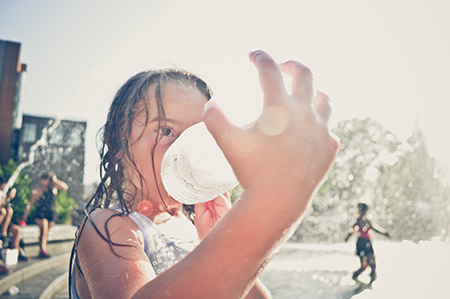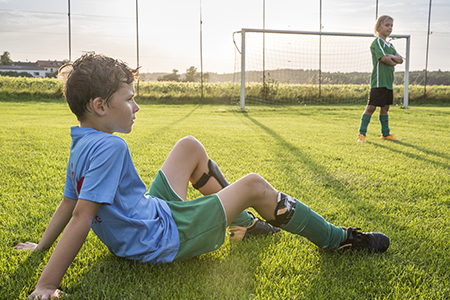 Keeping children hydrated is key to prevent overheating, Dye said.For parents of toddlers and young children, summer can be the most fun time of year. However, with high temperatures and different routines for families, the season also poses concerns and potential threats to a child’s health. Young kids have a hard time recognizing that they are overheating and have trouble verbalizing exactly what they need. They are often in and out of hot cars, play on hot playgrounds, and more.
Keeping children hydrated is key to prevent overheating, Dye said.For parents of toddlers and young children, summer can be the most fun time of year. However, with high temperatures and different routines for families, the season also poses concerns and potential threats to a child’s health. Young kids have a hard time recognizing that they are overheating and have trouble verbalizing exactly what they need. They are often in and out of hot cars, play on hot playgrounds, and more.
With heat waves spreading cross-country — particularly in the Southeast — pediatrician Candice Dye, M.D., from the University of Alabama at Birmingham Department of Pediatrics shares tips that parents and adults can keep in mind as they finish out summer with their families.
Q: How do you know if toddlers are overheating? What about school-age children?
A: Infants are not going to sweat the same as older children and adults, and that is something that adults need to watch out for. In fact, most children (no matter what age) are not going to voice they are hot until they are really hot, if at all. Just about everyone gets red and flushed when hot, so if you are sweating and hot, your child probably is too. This is a normal body response. Remember to increase hydration — drink water, drink water, drink water!
I always remind adults to be the parent/caregiver. If we plan ahead and keep kids hydrated and protected from the start, then frequently reassess and supply fresh hydration, reapply sunscreen, or encourage taking a break and rest in the shade, then a lot of fun can still be had!
Q: How often should parents reapply sunscreen? What about sun-protective clothing?
A: Always a minimum of SPF 30, and parents need to reapply every two hours, at minimum. Each time your child gets out of the water or comes in the house after playing outside, it is time to reapply. A good rule of thumb is applying more than you think is needed, and it should be a bit of work to rub it in each time. I like to remind parents to set an alarm on their phone to reapply, or else it is easy to forget!
For clothing, there are a lot of options that can help protect kids from the strong sun while outside, be it at camp, in the backyard or at the playground. Light, loose-fitting clothing with breathable fabric works great, plus wearing a hat that provides shade to the face — in addition to sunscreen. If your child is swimming, rash guards are helpful because of the sunblock aspect; but children still need to wear sunscreen and reapply frequently.
 Playing sports in the heat of day can exhaust kids quickly, so keeping extra water and sunscreen nearby can help keep them safe. Q: What are your tips for keeping kids hydrated during summer heat?
Playing sports in the heat of day can exhaust kids quickly, so keeping extra water and sunscreen nearby can help keep them safe. Q: What are your tips for keeping kids hydrated during summer heat?
A: Drink water before, during and after any activity! It is key to always start with being hydrated. From that baseline, if in the heat, exercising or playing, parents need to increase their child’s water intake frequently by making them drink water every 20 minutes. If possible, avoid having children play during the highest heat of the day by doing outside activities early in the morning or later in the evening, when possible. While we are used to the humidity and heat in the South, we need to make sure to not ignore it — be smart by planning, acting and playing accordingly!
It is also a good reminder that most hydration should be achieved with good old water. Sports drinks can be helpful occasionally to replace electrolytes at sports camps that are outdoors and strenuous. Be cautious with thinking that sports drinks are healthy for everyday consumption — there is a time and place for everything, but they have additional sugar that children do not need, especially at their baseline hydration.
Q: It is tough to see stories about children being left in hot cars. What preventive measures do you share with parents?
A: This is a tough subject and one that we are seeing more frequently in the news. As a parent, I make a conscious point to put my cellphone and purse in the backseat with my child, so I have an additional reminder to go to the back of my car when I have reached my destination.
In hot months, a parent’s routine is often different from the rest of the year, so one can easily have a memory lapse; but forgetting a child in a hot car could be deadly. By placing your cellphone, purse or work bag in the backseat, that additional reminder can make the difference.
Q: What other hidden heat harms should parents be mindful of?
A: It is easy to forget that, as hot as we feel when we are outside in scorching temperatures, objects like toys in the yard, the playground and patio furniture are even hotter. Even items like water hoses that have been sitting in the sun are an extreme risk, as that first stream of water will be scorching hot and could endanger a child if they are in its path. Drinks left in the car are hot, too!